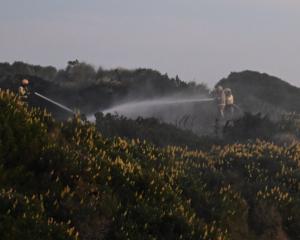[comment caption=Do you think this chemical could be harmful to the public?]The Dunedin City Council has no plans to discontinue the use of an insecticide banned in 50 countries and described by the Green Party as "highly toxic".
Dunedin City Council parks and reserves team leader Martin Thompson yesterday confirmed endosulfan had been used at the Caledonian and the University Oval three times in the past two years.
But an Environmental Risk Management Authority (ERMA) reassessment of the insecticide, expected to be completed later this year, could force the council's hand.
Greens health spokeswoman Sue Kedgley said yesterday 18 councils sprayed endosulfan on sports fields in New Zealand, which was the only country in the world that used the insecticide.
Endosulfan could remain in the soil for up to six years, and any skin or mouth contact with the soil could harm, she said.
"Endosulfan is a highly toxic insecticide which affects people's hormonal system, and is linked to breast cancer, endometriosis, male breast enlargement and delayed sexual maturity," Ms Kedgley said.
"It can cause birth defects, and is linked to epilepsy, autism, cerebral palsy, lowered IQ, and Parkinson's disease."
But Local Government New Zealand has leapt to the defence of its members. President Lawrence Yule said yesterday council staff understood health and safety issues.
"They only use products that are allowed in this country and that are fit for the purpose they are made for. Council staff also follow any instructions and conditions applicable to chemical products."
The use of endosulfan is being reassessed by ERMA, which called for public submissions on the continued use of the insecticide in June, following the imposition of tighter restrictions or withdrawal of the product from the market in Australia, the United States and Europe.
Mr Thompson said yesterday endosulfan was used to kill earthworms, which left casts - the waste worms ejected on to the surface of turf.
Casts hampered the appearance of the city's two "high profile" fields, made them uneven and affected their durability.
He said endosulfan was recommended by industry body the New Zealand Sports Turf Institute.
The insecticide was usually only used during rain, so it would wash into the soil, though both grounds had irrigation that could be used instead.
The grounds were closed for the correct period after it was used.
Mr Thompson said the council did not intend to stop using the insecticide, though it would do so if ERMA changed its rules.
An ERMA spokeswoman said yesterday more than 180 submissions were received on the reassessment, and a public hearing would be held in Wellington on October 21.
Following the hearing, the authority expected to make a final decision on the future of the chemical before Christmas.
"If the benefits outweigh the risks and costs, the authority may approve the continued use of endosulfan in New Zealand for some or all of its current uses, possibly with stricter controls or with further restrictions on use.
"If the benefits do not outweigh the risks or costs then the authority may decide to prohibit it outright."











